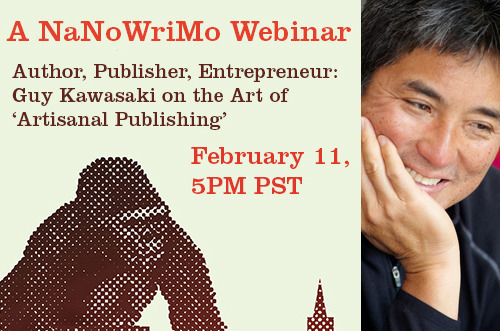Why Self-Publishing Is a Craft... And How You Can Master It
The “Now What?” Months are here! In 2014, we’ll be bringing you advice from authors who published their NaNo-novels, editors, agents, and more to help you polish November’s first draft until it gleams. Today, Guy Kawasaki, former chief evangelist for Apple, and author of APE: Author, Publisher, Entrepreneur , shares why he prefers the term “artisanal publishing”:
What led you to write APE?
I felt so much pain because I self-published my previous book, What the Plus!. In the words of Steve Jobs, “There must be a better way.”
When I could discover no better explanation of self-publishing, I decided to write the book about it to help everyone else going through the process.
You’ve coined the phrase “artisanal publishing”—can you elaborate on what that means?
"Self-publishing" can have negative connotations. That is, an author had to self-publish because his or her book was not good enough for a "real publisher." This is sometimes true, but it’s certainly not always true.
I like the phrase “artisanal publishing” because it fosters the image of an author/craftsman who truly cares about his or her work.
Why is it important to shift the conversation when discussing self vs. traditional publishing?
I’m not sure that it is important to shift the conversation. What’s important is that you get a good book out that is properly copy-edited, designed, covered, and distributed. If a traditional publisher will do this for you, alleluia. I just have my doubts that traditional publishing works well for most writers.
Why have you personally opted for artisanal publishing over traditional publishing?
The two key factors are control and speed. Control means that I can write what I want and sell it the way I want. Speed means that I can get a book out 6-9 months faster than a traditional publisher.
How does the creative process of writing complement the creativity that goes into publishing?
The two are not necessarily related. Creative writing and creative marketing, sales, and distribution are two very different things. One of the burdens of artisanal publishing is that you have to be good at both.
All the functions that are necessary to make a book successful are necessary whether the book is traditionally or artisanally published. It’s not like you get to skip steps with the artisanal path.
How can people utilize social media throughout the editing/revision process?
Use social media to solicit people who would like to read and test your book in its final stages. Then trust them and send them the Word document with “track changes” turned on. Ask them to make their suggestions and send you back the Word file. I sent the APE manuscript to approximately 250 people. Seventy-five or so returned it with suggestions. There were literally hundreds of great suggestions.
If you don’t have the ovaries or balls to do this, then use social media for specific questions. For example, when I was searching for a book that was written purely for the intellectual challenge, I asked my followers and got a terrific example that was written without any words containing the letter “e.” I would have never found out about that book without social media.
A huge portion of artisanal publishing relies on good marketing of the finished product. APE discusses this at length. Can you share some of your favorite marketing tips?
My favorite marketing tip is to use social media to get a large number of beta testers as I just mentioned. Then, when your book goes on sale, ask them to immediately write reviews of it.
Assuming your book is good, this guarantees a great start to the book review process.
If you’d like to hear more of Guy’s self-publishing tips, he’s offering a webinar to anyone who donates to our nonprofit!
Guy Kawasaki is the author of APE: Author, Publisher, Entrepreneur—How to Publish a Book . Previously, he was the chief evangelist of Apple. Kawasaki has a BA from Stanford University and an MBA from UCLA as well as an honorary doctorate from Babson College.
Chris Baty's Blog
- Chris Baty's profile
- 63 followers




